Wake your students up!
Get them outdoors and up close and personal with nature
Scout Island Nature Centre offers school programs for grades K-12 from September through June. The programs always offer direct experience with nature and may take place at the Nature Centre, at your school or in the River Valley. The programs offered change with the season and with staff availability. All our programs are linked to Prescribed Learning Outcomes for each grade. Depending on the time of year, the programs are led by Environmental Educators Sue Hemphill and others or by trained teacher-naturalists (university students on staff from May-August). We encourage teachers to contact us to discuss specifics of your field trip – information and activities you would like to have included. We can even arrange an overnight visit for your class. We offer programs in the following subject areas:
- Adaptations
- Aquatic Ecosystems
- Terrestrial Ecosystems
- Energy Transfer
- Evolution/classification
- Invasive Species
- Aquatic and Terrestrial Invertebrates
- Plants
- Salmonids
- Vertebrates (birds, mammals, amphibians, and reptiles)
- Ecological Footprint
- Nature journaling and story writing
Programs developed by biologist/teacher Sue Hemphill, Executive Director, Paula Laita Education Coordinator, and Mary Forbes, Natural History Educator
General Information
These programs are possible because of generous donations from:
- School District 27
- City of Williams Lake
- Fisheries and Oceans Canada
- Community members and businesses
- Volunteer time from the Williams Lake Field Naturalists
Cost: Programs are free to classes from School District 27. Other schools pay $5 per student. Minimum cost is $30 for a program.
For more information about this season’s programs or to book a program call 250-398-8532 or e-mail .
Be Prepared:
- Dress for changeable weather including cold weather
- Wear good walking shoes or boots for wet weather
- Bring water, sun hats, sun block as needed
Expectations
We are guests in the home of the plants and animals living at the Nature Centre. We admire and observe them and then leave them as found.
- Encourage students to pack No Garbage Lunches and Snacks
- You are responsible for your own garbage and recyclables (take them home with you). We do have a compost bucket.
- No electronics should be used by students during any part of the program. We want students interacting with nature directly, not through a camera
- Stay on trails unless we are doing an exploration off trail
|
Scout Island Nature Centre works hard at shrinking its Ecological Footprint so that the we are in balance with the web of life. You can help us by packing No Garbage Lunches and Snacks when you visit.
|
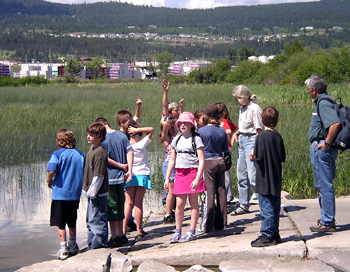 Primary Programs
Primary Programs
- Spring school programs (May and June): 1½ hour sessions for grades K-3 led by summer staff (university students) on a variety of natural history topics at the Nature Centre or at your school (spring brochure available May 1 each year)
- Winter (November-April) Half- or full-day sessions at the Nature Centre, led by Environmental Educators: Snow play, tracking, winter birds
Intermediate Programs
- Spring school programs (May and June): 2 hour sessions for grades 4 -7 led by summer staff (university students) on a variety of natural history topics at the Nature Centre or at your school (see spring brochure available May 1 each year
- Fall/Winter (September-April): Half or full day sessions at the Nature Centre, at your school or in the River Valley led by Environmental Educators on a variety of natural history topics.
For more information about this season’s programs or to book a program call 250-398-8532 or e-mail .
High School Programs
Expeditions to either Scout Island or the Williams Lake River Valley and other sites give students the opportunity to investigate first hand the ecosystems they live in. The experiences help them practice and understand Life Science concepts covered in Grade 8-10 Science, Grade 11 Biology, Science and Technology 11, and Geography 12. Investigating a variety of materials and outdoor habitats in these programs will reinforce concepts you are working on in class. We will work with you to meet your curriculum needs and would be pleased to do a follow-up classroom visit or provide pre- and post-field trip ideas.
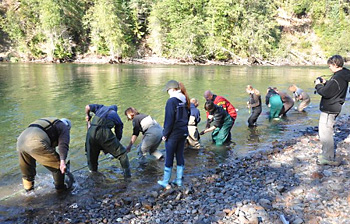 Grades 9-12
Grades 9-12
Individual students can apply to take part in the three-day September “Salmon Trip” at Gavin Lake and Quesnel River Research Centre that offers a variety of activities including brood stock collection, aquatic insect research, stream surveys, etc. Students may also choose to help with Rivers Day Celebrations, festivals (act as leaders) and/or work directly with university students doing research in the area.
Biology teachers and high school students should contact Sue at the Nature Centre to discuss how to be involved in this program.
Environment and Ecology Course for grades 9-12
Scout Island staff and UBC Research Forest’s staff lead an environmental studies course designed to give students hands on experience and knowledge about the local environment and to learn about careers in this field.
Student participation will include
- There will be 3-5 field trips in 2023-2024 during school time.
- Students would need to commit to 3 or more trips for the year
- Each day trip will require 2 hours of prep (students will be sent information ahead of time to explore) and 2 hours of follow up (some type of report, presentation or other activity that UBC/SINC staff would evaluate
- The field trips will take place at a variety of sites within a 1 hour radius of the high school including: Scout island Nature Centre, Gavin Lake Forestry Camp, and UBC Research Forest Sites. Except for the Salmon Trip, these will be school day trips and most trips will take place within school hours.
Here is what happened on the Forestry Field Trip
On Thursday November 30th, 2023 eleven grade 10-12 students loaded into four vehicles and rode out along Highway #20 to the Williams Lake Community Forest (WLCF) to get a taste of forestry activities happening in our region. The group spent the day near the Fraser River before returning to Lake City Secondary School for dismissal. They were led by host Hugh Flinton (WLCF manager) and we two “teacher guides”, while other adults taught them their specialties.
First, Ryan demonstrated some silviculture techniques in the Douglas Fir predominant forest. Some species ID, random circular sample plots, basal area prism use, and proper note-taking were the skills highlighted.
Then Wes and Dimitrius from Sugar Cane Archaeology explained why, and showed how, to take a core sample of a CMT (Culturally Marked Tree) in order to estimate its age, as well as how to measure the dimensions of a cultural circle (ex-winter house or food cache). They also showed us all the unique rock oven (see photo).
After lunch, students were led by Peter, Shay and Trevor from the BC Wildfire Service. They assisted the students in trying out how to safely execute prescribed burning of Rocky Mountain and Common Juniper shrubs using drip torches. Throughout the day the weather cooperated, and there were no serious safety accidents nor incidents to report
We hope to do other outdoor career exploration trips in the winter and spring. These field days are tentatively set for February 22 (wildlife) at Bull Mountain and May 2 (parks) at Westwick Lakes/DeSous Mountain.
Mark Gill, UBC Wild & Immersive Education Program Supervisor Martin Kruus, Scout Island Nature Center Education Coordinator
This course is made possible by a grant from the Drax Community Fund through the local Drax Williams Lake Pellet Plant. -Thank-you
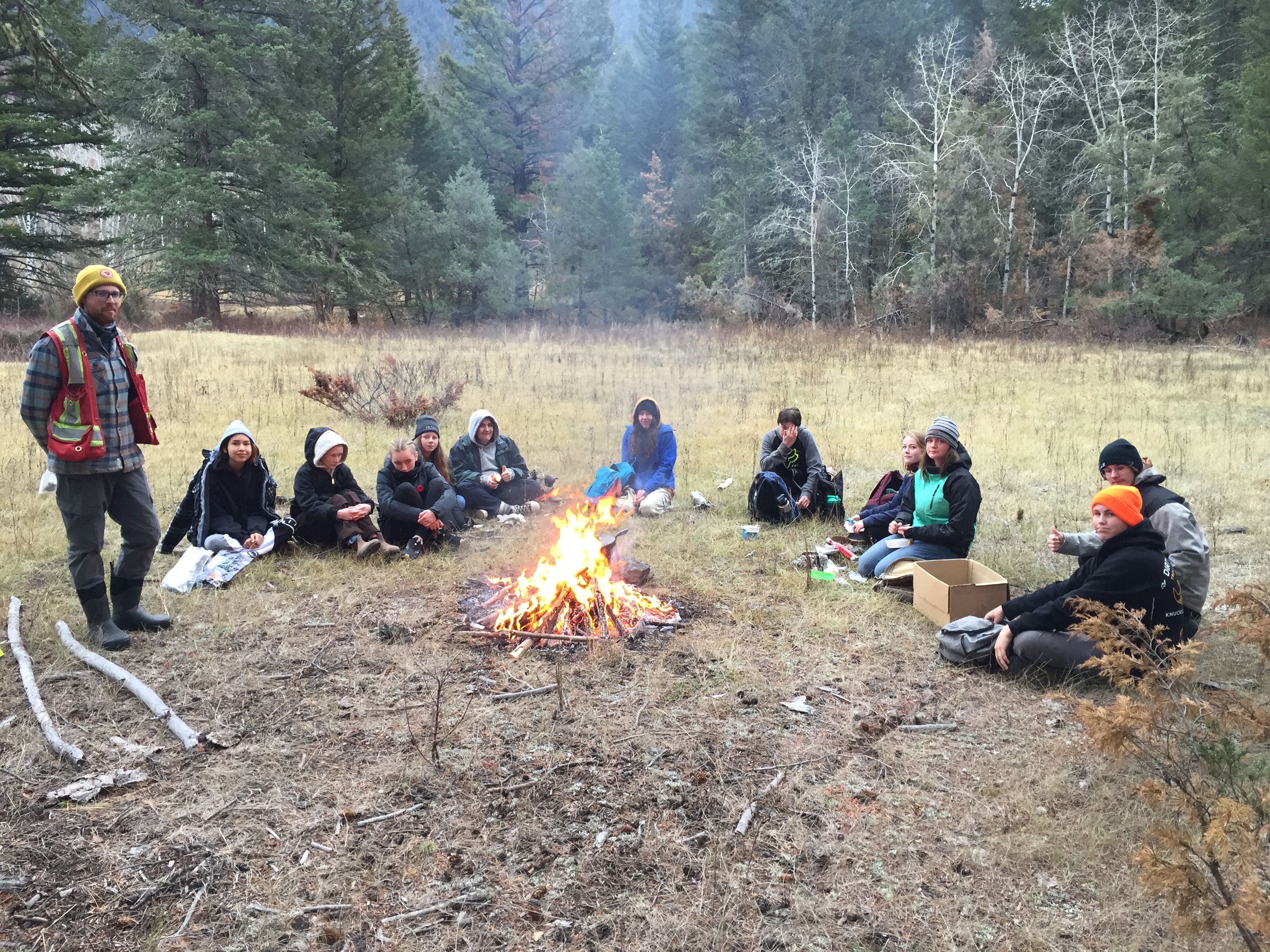
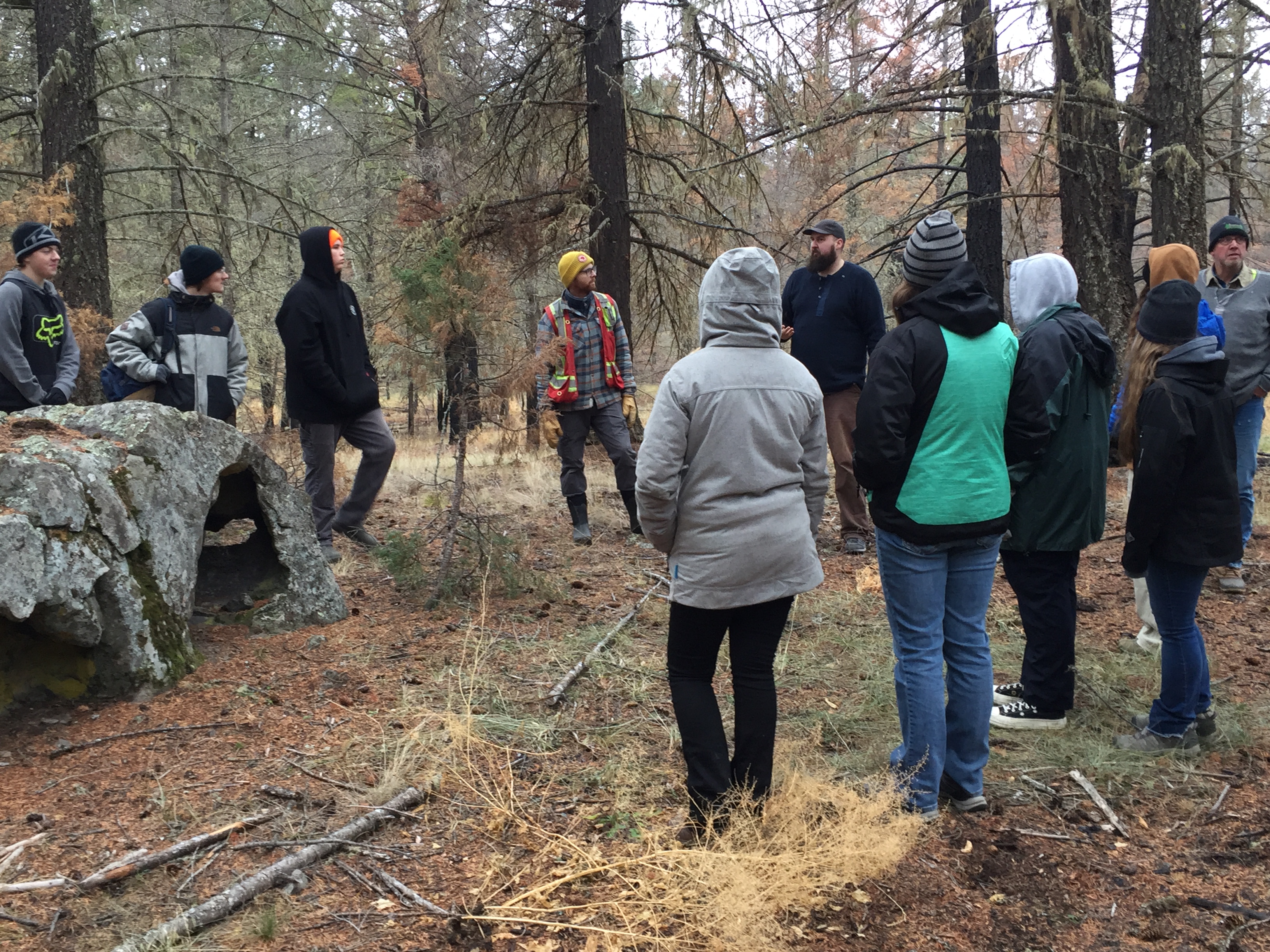
For more information about this season’s programs or to book a program call 250-398-8532 or e-mail .
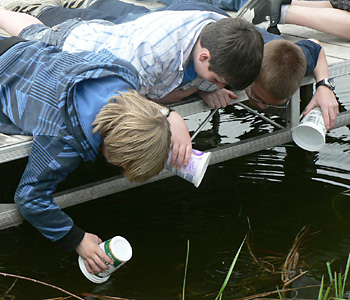 Salmon in the Classroom Program
Salmon in the Classroom Program
Scout Island Nature Centre provides this program for Fisheries and Oceans Canada. This program is open to grades K-12 at no cost to the school (SD 27 and private schools). Each classroom has its own tank and all the equipment necessary to raise Chinook fry from the eyed egg stage through to the fry stage. We provide support to the teacher and class through advice, help with tank maintenance and in-class lessons related to each life stage. Classes that do not want to host a tank can also follow the salmon using the tank at the Nature House and using the excellent materials listed below. We will provide the same lessons when the class visits the Nature House. Late spring, all the classes are invited to Scout Island to release fry and take part in a variety of related activities. Contact the Nature Centre early in September to join this program. This is a great program for integrating environmental learning into all curriculum areas. There are easy-to-use resource materials for grades K-12 available online.
- Fisheries and Oceans Canada Learning Resources
- DFO Stream to Sea education program
- The Pacific Streamkeepers Federation
For more information about this season’s programs or to book a program call 250-398-8532 or e-mail .
Language Arts and Visual Arts Programs
“Spawning Stories Hatching Change” is designed for primary, intermediate and high school English classes. The program includes:
- Visit to the Nature Centre lasting from 2-4 hours (teacher’s choice)
- Nature exploring and enjoyment related to the season of the visit
- Guided story-writing related to the experience
Be sure to check the Spawning Stories Hatching Change section of this web site for examples of past student work.
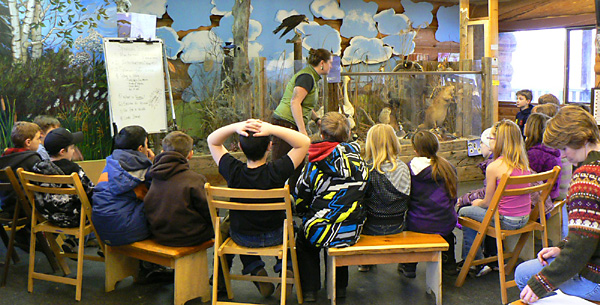
Art in Nature
Bring your students to the Nature Centre in any season. We will do a nature walk that fits the season and then the students can create indoors or out. The displays in the Nature House offer realistic models for inspiration.
For more information about this season’s programs or to book a program call 250-398-8532 or e-mail .
Environmental Education at Your School
The Environmental Educators will work with pre schools and elementary schools to develop activities that include outdoor nature exploration throughout the year in a variety of ways. The goal is to help you design a class or school program that incorporates outdoor activities and appreciation of nature in language arts, fine arts, science, and math. We will help you explore the areas on your school grounds and nearby forest or wetland on a regular basis – to study, enjoy, and take care of the natural world.






